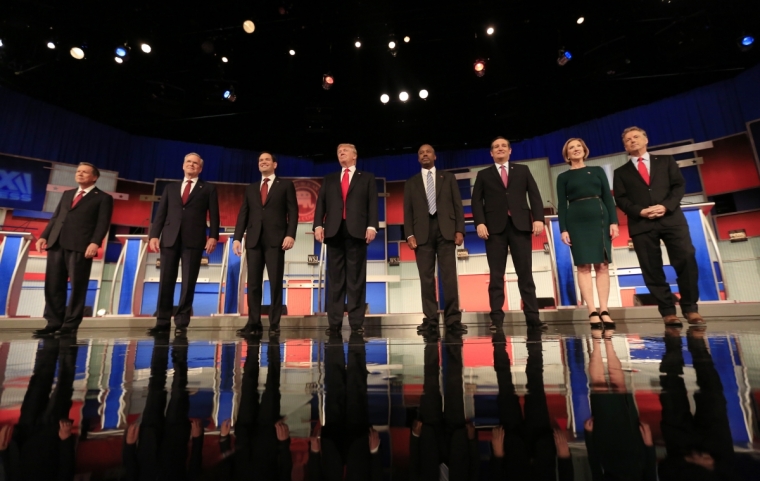GOP DEBATE -- Rubio: 'Family is the most important institution in society'

MILWAUKEE (Christian Examiner) – The fourth Republican presidential debate featured a smaller lineup as well as some of the most contentious exchanges yet on issues important to Republicans, including the family, the military and immigration.
Sens. Marco Rubio and Rand Paul may have engaged in the highlight of Tuesday's debate after Rubio defended his own tax proposal, which includes an increase in the child tax credit.
"I am proud that I have a pro-family tax code because the pro-family tax plan I have will strengthen the most important institution in the country – the family," Rubio said.
Paul, though, argued Rubio's plan isn't conservative.
"We have to decide what is conservative and what isn't conservative," Paul said. "Is it fiscally conservative to have a trillion dollar expenditure? We're not talking about giving people back their tax money. [Rubio is] talking about giving people money they didn't pay. It's a welfare transfer payment."
Rubio responded that in his plan, people are only getting money they have paid.
"This is their money. They do pay it," Rubio said. "... It's refundable against the payroll tax. Everyone pays payroll tax. This is their money. This is not our money. Here's what I don't understand: If you invest that money in a piece of equipment, if you invest that money in a business, you get to write it off your taxes. But if you invest it in your children, in the future of America ... we're not going to recognize that in our tax code? The family is the most important institution in society."
Said Paul: "Nevertheless, it's not very conservative.
When Rubio called him an isolationist on military issues, Paul asked, "How is it conservative to add a trillion dollar expenditure for the federal government that you're not paying for?"
Said Rubio: "We can't even have an economy if we're not safe. There are radical jihadists in the Middle East beheading people and crucifying Christians."
America is a safer and better place, Rubio concluded, when "America is the strongest military power in the world."
Paul retorted: "I don't think we're any safer from bankruptcy court, [and] as we go further and further in debt we become less and less safe."
The debate at the Milwaukee Theatre featured eight candidates instead of 10 as in previous contests, a smaller number that may have contributed to more back-and-forth. That seemed to be the case when Donald Trump and Ohio Gov. John Kasich sparred on immigration.
Trump was asked if he would physically remove millions of people from the country and send them back to Mexico.
"You are going to have to send people out," Trump answered. "Look, we're a country of laws. ... We have no choice if we're going to run our country properly and if we're going to be a country."
Kasich said such a proposal is not feasible.
"If people think that we are going to ship 11 million people who are law-abiding, who are in this country, and somehow pick them up at their house and ship them out of Mexico -- to Mexico ... think about the families," Kasich said. Think about the children."
The solution, Kasich argued, is to make those who already are in the country pay a penalty.
"We all know you can't pick them up and ship them across, back across the border," Kasich said. "It's a silly argument. It is not an adult argument. It makes no sense."
Trump responded by saying former President Dwight D. Eisenhower moved 1.5 million illegal immigrants out of the country.
Former Florida Gov. Jeb Bush also argued that Trump's position is not practical.
"And it's not embracing American values. And it would tear communities apart. And it would send a signal that we're not the kind of country that I know America is," Bush said.
On other issues, Ben Carson – who has surged in the polls in recent weeks – defended his tax proposal that he has compared to the biblical model of tithing.
"When I say tithing, I'm talking about the concept of proportionality," Carson said. "Everybody should pay the same proportion of what they make. You make $10 billion, you pay a billion. You make $10, you pay one. You get same rights and privileges. I don't see how anything gets a whole lot fairer than that. But you also have to get rid of all the deductions and all the loopholes because that is the thing that tilts it in one direction or another. And you have to set the rate at an appropriate level."
Carson added: "[People] say there will be no more charitable giving. ... The fact of the matter is, I believe if you put more money in people's pockets that they will actually be more generous rather than less generous."